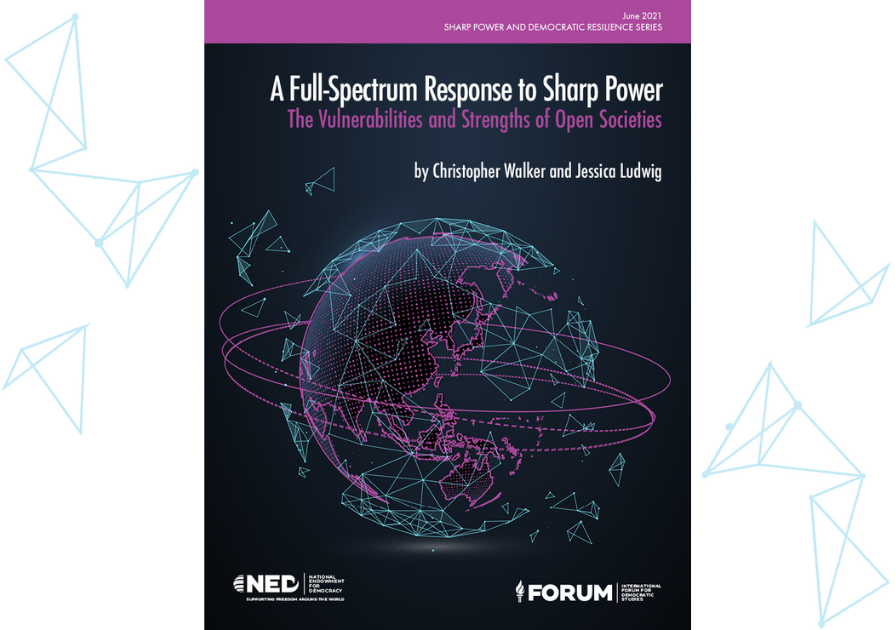Download the report
Full Text [PDF]: English | ESPAÑOL
Executive Summary [PDF]
As globalization has deepened integration between democracies and autocracies, the compromising effects of sharp power—which impairs free expression, neutralizes independent institutions, and distorts the political environment—have grown apparent across crucial sectors of open societies. Building upon its groundbreaking 2017 report, Sharp Power: Rising Authoritarian Influence, the International Forum for Democratic Studies undertook a two-year initiative to assess how modern forms of authoritarian influence affect the democratic infrastructure of open societies. The final report in the Sharp Power and Democratic Resilience series reviews the findings of eight papers that highlight serious vulnerabilities in a cluster of institutions related to information and ideas, commerce, media, and technology. During a period in which democracies have been preoccupied with internal problems, authoritarian regimes in Russia, China, and elsewhere have pushed boundaries and successfully exploited these vulnerabilities. Authoritarian powers’ compromising activities in these four sectors, among others, amount to a constant probing of democratic integrity. A response from the full spectrum of institutions within open societies is essential. Actors in the nongovernmental sector—including but not limited to media, universities, publishers, and technology and entertainment firms—must develop strategies for resilience in the face of authoritarian influence that reinforce standards of openness, accountability, and institutional integrity.
The independent civil society sector, which authoritarians view as a weak point, should be recognized as one of democracy’s great strengths and mobilized accordingly.
Key Ideas Underpinning a Full-Spectrum Democratic Response
- Civil society—broadly understood—is a crucial part of democracies’ competitive advantage over authoritarian states. Any number of civil society institutions are increasingly suffering from the effects of sharp power, necessitating a more affirmative and purposeful response.
- Today’s challenges cannot be viewed as either purely domestic or purely external. Refreshing and strengthening critical democratic institutions internally, on the one hand, and safeguarding them from the compromising or corrosive influence of external authoritarian powers, on the other, are mutually reinforcing exercises.
- Autocrats’ divide-and-conquer methods must be met with democratic unity. A central feature of authoritarian governance is the divide-and-conquer approach to exercising power. The leaders of critical institutions in democracies should coordinate with one another rather than attempt to grapple with authoritarian pressure on their own.
- Civil society can help address persistent political-literacy gaps regarding China and Russia. A civil society sector that is knowledgeable on and alert to the risks of engagement with global authoritarian powers can contribute to greater transparency and informed policymaking, and ultimately serve as a vital line of defense that reinforces the institutional integrity of democracies.
- In the technology sphere, democracies need to stimulate a race to the top. Given the degree to which modern technology is shaping the political landscape, democracies must deepen efforts to encourage free expression, integrity of information, and essential privacy safeguards.
- Democracies of all stripes have a stake in this struggle. If better resourced, more established democracies cannot achieve essential reforms to resist authoritarian influence, it bodes poorly for their more vulnerable counterparts around the world. Democracies at different levels of development—and at different stages of awareness—will need to share information and expertise in new ways.
- Democracies must shift from an awareness-raising phase to more concerted action. As the reports in this series observe, an active response is taking shape in certain sectors. For instance, media outlets, civil society groups, and technology enterprises are finding innovative ways to rebuff Beijing’s sharp power intrusions in the media sphere. The countries with the most advanced civil society efforts to investigate, report on, and build understanding about the nature and forms of sharp power, such as Australia, Taiwan, and the Czech Republic, have arguably made the most progress in this respect. Successful measures in individual countries must now be accelerated and scaled up in a concerted fashion by other democracies.


